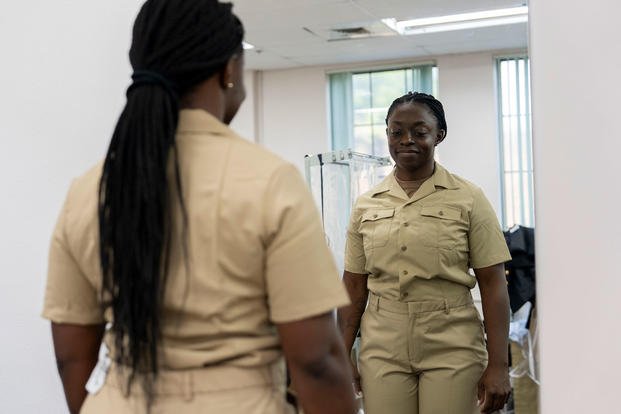The Pentagon said Thursday it is working on another tranche of changes and programs — including Wi-Fi in barracks rooms, new health care options, and flexibility in enlisted uniform allowances — that may improve the lives of service members.
Officials who spoke to reporters Thursday said that the moves, which range from studies to programs that are close to being put into effect, are the result of Defense Secretary Lloyd Austin’s commitment to taking care of military members but also efforts to listen to troops and what they need.
One of the most immediate changes would make permanent change of station, or PCS, moves easier by expanding how long service members can use government funds to stay in temporary housing. Troops will now get 21 days of funds if they are moving inside the continental U.S. and up to 60 days if they are coming from outside the lower 48 states.
Read Next: Feds Arrest Soldier at Schofield Barracks for Jan. 6 Assault on Police — a Day After He Was Booted
The “My Career Advancement Account,” or MyCAA, program will also be expanded. The scholarship fund of $4,000 is aimed at helping military spouses get professional credentials to enable them to work or grow their careers.
The spouses of active-duty service members serving in the top three enlisted ranks of E-7, E-8 and E-9, as well as warrant officer 3, will now be able to use the money to get licenses, certifications or associate degrees.
A group of five Pentagon officials spoke to reporters Thursday about the changes under condition of anonymity.
However, outside of the handful of immediate changes, most of the plans that the Pentagon outlined have long lead times and many service members may have to wait months, if not years, to see any benefits.
When asked whether they felt they were moving fast enough to address some of the acute concerns service members are experiencing, officials pointed to the Pentagon’s long history of work on the topics of increasing pay and benefits but didn’t offer a direct answer.
Looking more into the future, the Pentagon says it is also planning on expanding Wi-Fi pilot programs that put free high-speed internet into housing where junior, single service members live.
One official told reporters that the Navy is currently running a pilot program that offers wireless internet to about 4,000 rooms in 12 facilities in Hampton Roads, Virginia, and the Marine Corps launched a Wi-Fi pilot in June, also at 12 facilities across four installations, that covers about 2,500 rooms.
“We are using an iterative process to learn from the Navy and Marine Corps …. and we’re going to take that learning and quickly scale that into Department of the Air Force and Army pilots at the end of this calendar year or the start of next,” the official added. The Air Force department includes the Space Force.
The Pentagon also wants to study its standard issue uniform items in order to see whether “the items meet their intended wear life,” a fact sheet on the plans said.
At the same time, officials said that they also want to take a look at the annual uniform subsidy that all military service members receive to pay for or subsidize uniform maintenance and upkeep.
“We’re just taking a wide look at how people want to receive that allowance and then how they want to use it,” one official said of the uniform subsidy. “We think the most flexible models are probably the best.”
“Some people may want to get those uniforms through the exchange; others might want to get them through a different method,” they added.
The Pentagon expects that the quality review of the uniform clothing will be performed by April 2025. The review of the enlisted cash uniform replacement allowance rates will be finished by September 2025.
Other benefits coming in the future include a new health savings plan that more closely matches what employers offer civilians, and greater salaries for managers and supervisors at child care centers to help increase retention.
But overall, most of the officials who spoke with reporters acknowledged that not only are their efforts important but they are far from all the Pentagon needs to do to address service member concerns.
“As we look at this new set of actions, it is important to also consider the aggregate and … think about this as incremental things that we continue to do to get after the issues that we are hearing about,” one official said.
Related: Marine Corps Cammie Items Are Back in Stock After Shortages Due to Pandemic-Related Supply Disruptions
Story Continues
Read the full article here

